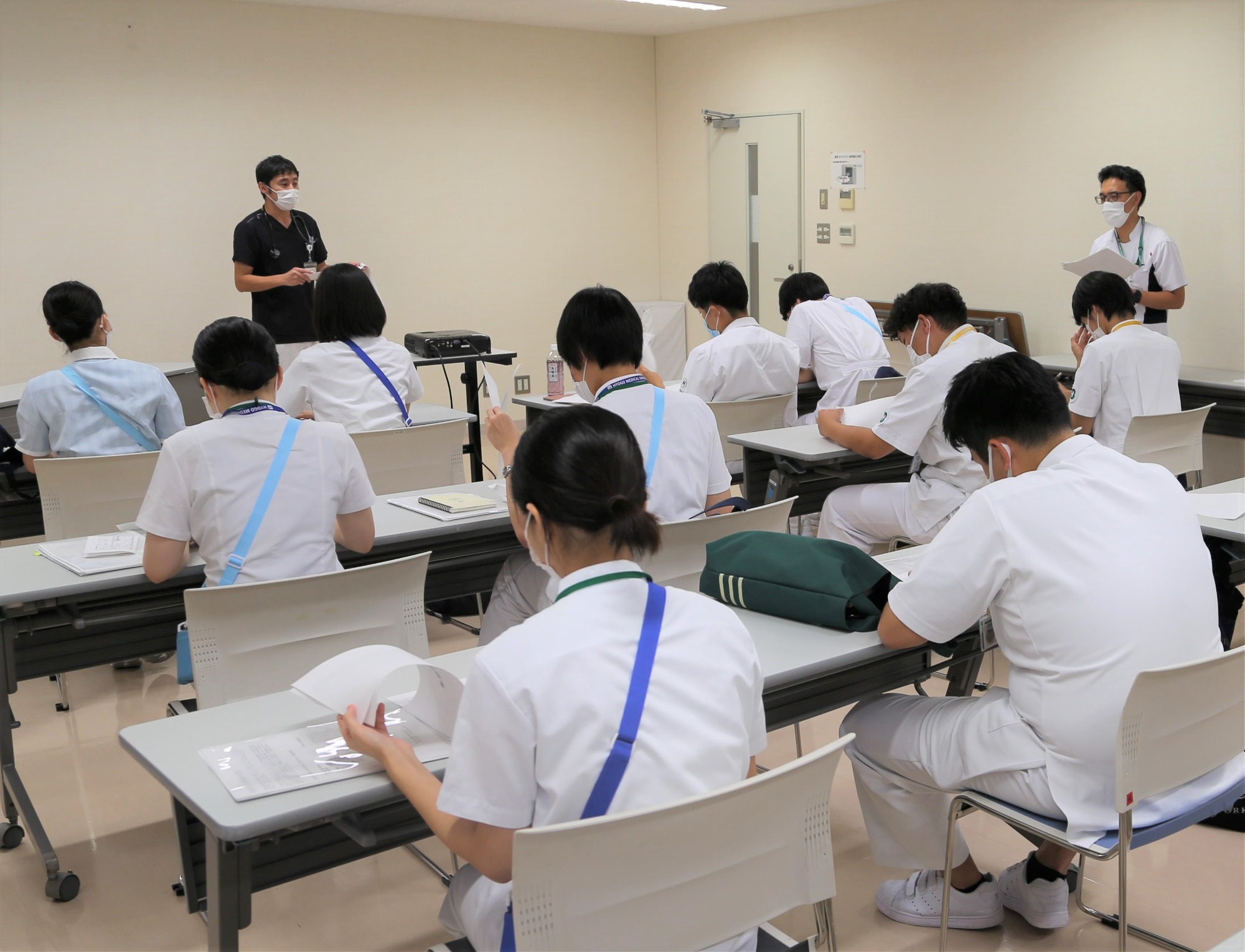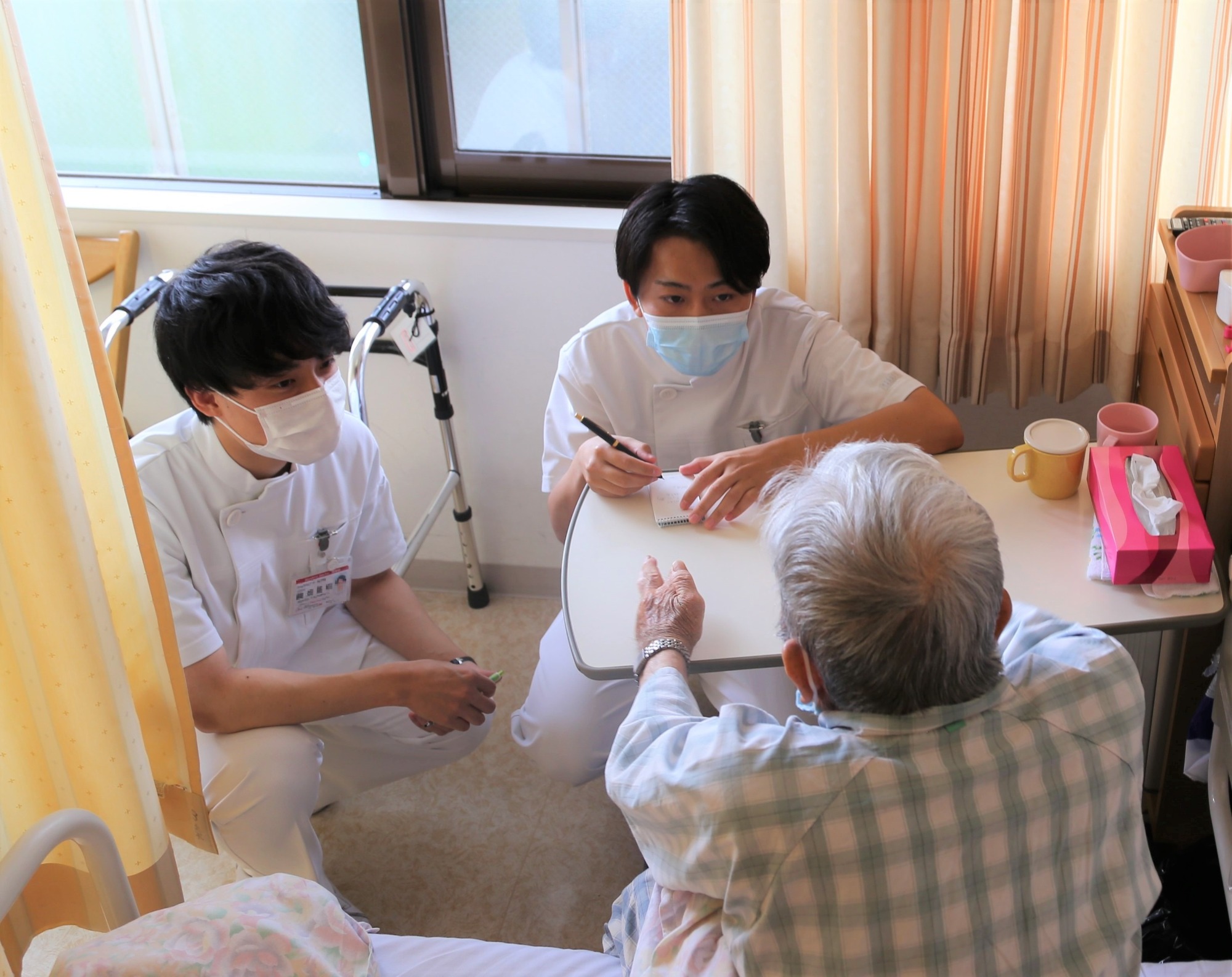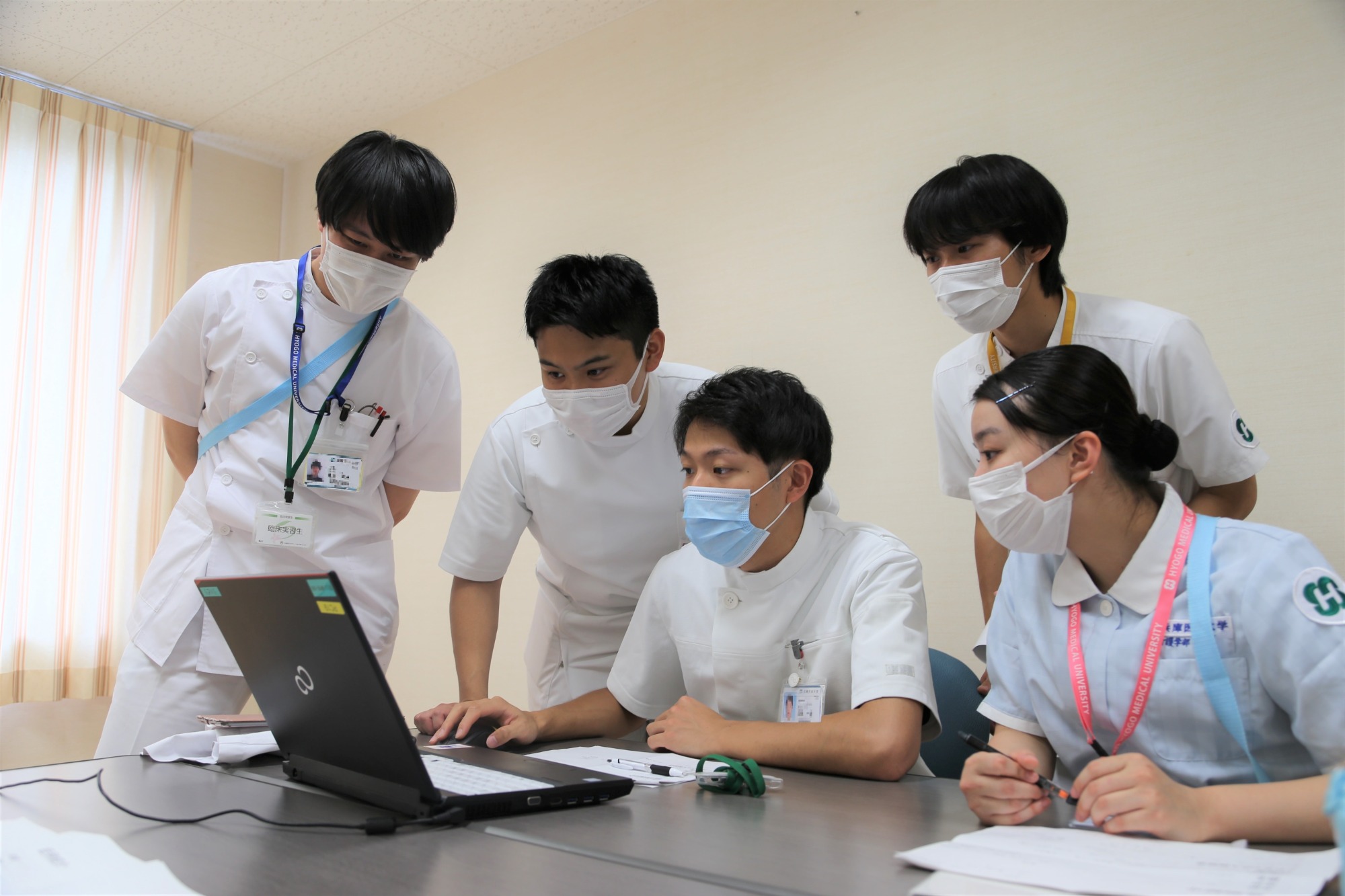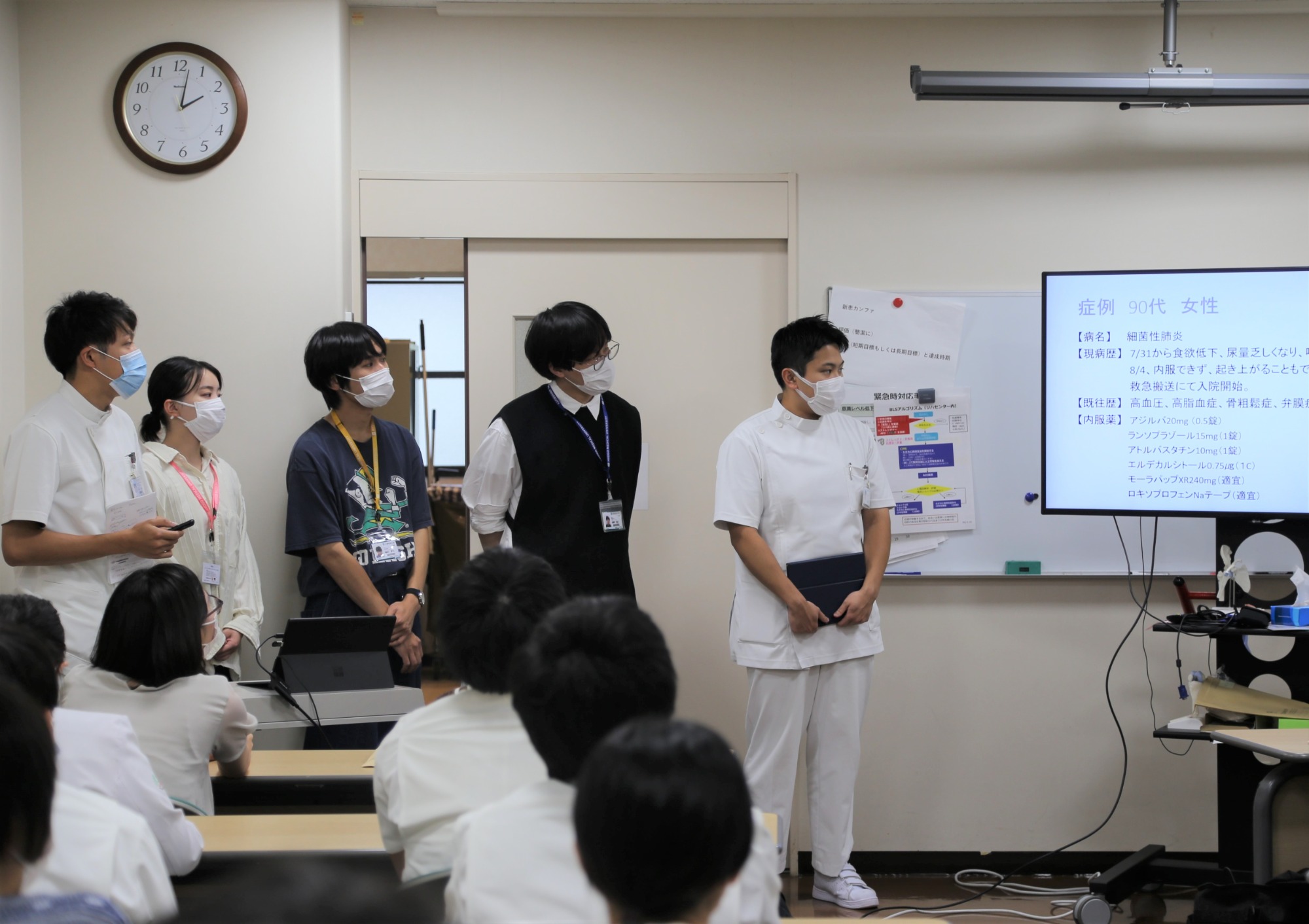Undergraduate and Graduate School
Multidisciplinary Comprehensive Clinical Training (School of Medicine and School of Pharmacy: 5th year / School of Nursing and School of Rehabilitation: 4th year)
Hyogo Medical University has taken a new step forward as a "comprehensive medical university" with four faculties: School of Medicine, School of Pharmacy, School of Nursing, and School of Rehabilitation, through the merger with Hyogo University of Health Sciences. In order to further develop the IPE (interprofessional collaborative education) that has been promoted so far, which transcends the boundaries of faculties and professions, the four faculties will conduct a comprehensive interprofessional collaborative clinical training at Sasayama Medical Center. This training involves actually interviewing patients and considering hospitalization treatment plans and discharge support through group discussions with multiple professions.
Training Schedule
1日目
·orientation
・Greet and introduce yourself to ward staff
・Greeting the patient
・Creating a hospital treatment plan
・Four-faculty joint mini-conference

orientation
The director will give an orientation about patient-centered medical methods, the head of nursing will give an overview of the facility, and the supervising professor will give an orientation about multi-disciplinary clinical training.
Days 2 to 4
・Confirmation of treatment plan
・Examination of patients
・Group discussion
・Four-faculty joint mini-conference
・Participation in discharge guidance
・Tours of elderly care facilities, rehabilitation facilities, and pharmacy departments

Examining patients
We interview patients and organize information to create inpatient treatment plans and support discharge.

Group discussion
Based on the medical examination details of each patient evaluated by each faculty, inpatient treatment plans and support plans are created through group discussions.
5日目
·presentation
・Commentary and certificate of completion

presentation
Each group will give a presentation about the discharge support plans for the patients they are responsible for.
Comments from participating students
What specifically did you do in this internship?
◆Case studies and presentations were conducted in cooperation with the four faculties of Medicine, Pharmacy, Nursing and Rehabilitation. In the case studies, information was collected and problems and issues were extracted from the information obtained. Furthermore, goals and objectives were set for the patients, and discussions were held on treatment and rehabilitation policies, including what was needed to achieve these. When collecting information, students did not just use medical records, but actually interviewed the patients, and during the case presentations, the contents of the case studies were presented to the professors using PowerPoint. [Fourth year students in the Department of Department of Physical Therapy School of Rehabilitation]
◆When making admission and discharge plans for the patients they were in charge of, each group member discussed, making use of their expertise in each field, and decided in advance what to ask and what to pay attention to when observing daily movements. For example, they asked students from School of Nursing and School of Rehabilitation if there were any problems with the patient's ability to swallow when taking medication, and after receiving their evaluation they made prescription suggestions. They also placed importance on how to reflect the patient's wishes, so each group member shared what they had heard directly from the patient and created a plan that would reflect the wishes with the highest priority. In addition to group work, they also toured the Sasayama Medical Center facilities, observed actual rehabilitation procedures, and experienced the equipment. [Fifth year students School of Pharmacy]
②What realizations or discoveries did you make about interprofessional collaboration through your internship? Also, how do you think that will be useful to you in the future?
◆I was able to learn about the information and strengths of each profession. I also learned the importance of communicating clearly to other professions, as terminology that is commonplace within the faculty was actually specialized terminology only in my own field. Since each profession has a different perspective on patients, I believe that by actively exchanging opinions, I can broaden my own horizons and also broaden the range of suggestions I can make to patients, allowing me to consider ways to improve their lives. I believe that this internship experience has increased my awareness of interacting with other professions, which will lead to smoother communication. [4th year student, Department of Department of Occupational Therapy School of Rehabilitation]
◆I gained new knowledge by coming into contact with professions I was not familiar with, and learned the importance of medical professionals and patients thinking about each other's thoughts and respecting each other. Also, I think that by "involving patients in a serious and voluntary manner from student age", which is a little different from practical training, I will feel less nervous and anxious when I go into the field in the future. Since I actually interact with patients with illnesses, there were many situations where my intentions were not fully conveyed no matter how many times I spoke to them. However, after many discussions with the members of my group about "how should we interact next time to get them interested?" and repeated failures, I was really happy when I finally managed to get them to listen to me. I realized that it is very important to have a "never give up spirit" and not lose the desire to help patients. [Fifth year students School of Pharmacy]
③What was the most difficult (toughest) aspect of this training? Please also tell us the reason.
◆Proposing prescriptions in line with the patient's wishes. This was my first experience with selecting which prescription drugs should be left while being mindful of polypharmacy (Note 1) for elderly patients, and proposing optimal prescriptions while understanding their attitudes toward taking medication and their perceptions of the drug's effectiveness, so I found it extremely difficult. There were times when it was difficult to make a judgment without talking to the patient directly, such as which drug they actually felt was more effective, and I found the difference from case-based approaches difficult. [Fifth year student School of Pharmacy]
◆When discussing with other faculties, the technical terms I knew were biased depending on my occupation. Therefore, I tried not to use abbreviations and to explain the contents of tests concisely. [4th year student in the Department of Department of Physical Therapy School of Rehabilitation]
◆ There was a difference of opinion between the patients I was in charge of and their families about what they wanted to do after discharge. Before participating in the conference, I had been thinking of proposals that would respect the patients' own thoughts as much as possible, but after participating in the conference, I felt that in reality, due to family circumstances, some things would be difficult to do. Because we can only see patients while they are hospitalized, I felt that it was essential to share information about their daily lives between medical social workers (MSWs) (Note 2) and care managers (Note 3) and other medical professionals. [Fifth year student School of Pharmacy]
(Note 1) Polypharmacy refers to the "state in which more medications are prescribed than necessary" or the "state in which unnecessary medications are prescribed."
(Note 2) Medical social worker (MSW): A social worker in a health care institution such as a hospital or health center (a professional who provides social welfare support to people who have problems in their daily lives due to illness or disability).
(Note 3) Care manager: A professional related to nursing care insurance who creates care plans (service plans) and coordinates with service providers so that people who need nursing care can receive nursing care insurance services. Also known as a care manager.
4. What aspect of this training did you feel most accomplished (enjoyed)? Please also tell us the reason.
◆The fact that I was able to complete the training right up to the presentation on the final day. I decided to participate in this training because I thought it would help me improve my skills and be able to use them in future clinical situations. As this was the first attempt of its kind at our university and there was no precedent, I was anxious before the training started as there were no teachers or seniors to consult with. However, by working closely with the teachers and other students who were participating, I felt a sense of accomplishment in being able to complete the training safely over the five days to the end. I was nervous about presenting in front of so many people, but the teachers listened carefully to what the students had to say and filled in any missing information, so I think it was good that we were able to finish in a very good atmosphere. [4th year students in the Department of Department of Occupational Therapy School of Rehabilitation]
◆I was able to make use of the knowledge I had learned in the case study. It was my first time to hold discussions in cooperation with other departments in an actual clinical setting, so it was a very good experience. I also made many new discoveries while listening to the opinions of other departments, and I would like to learn about various fields in addition to the ones I have studied so far. [4th year student in the Department of Department of Physical Therapy School of Rehabilitation]
⑤How does this training differ from the team medical care seminar jointly conducted by four faculties?
◆In the team medical theory exercise, discussions were based on virtual patient data and cases, but in this training, discussions were held with actual patients. In the team medical theory exercise, there was little information about the patient's thoughts and feelings, and discussions were based on conclusions written down such as "this is what they are thinking." However, this time, by communicating with actual patients, we were able to obtain a lot of information and communicate a lot with students from other faculties. As a result, the way of thinking of each profession, the roles of our own profession and the roles of other professions, and the content of the consultations became clearer, and I think we were able to have deeper discussions. [4th year students School of Nursing]
◆As in the team medical seminar, we also held discussions in mixed-faculty groups, but this time, we actually faced patients and their families, so we had to think about issues such as the patient's feelings, environment, and ability to assist them. In addition, we realized that the patient's condition changes daily, so we need to respond accordingly. [Fourth year students in the Department of Department of Occupational Therapy School of Rehabilitation]